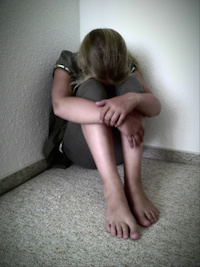 Anxiety is not just a fluttery feeling in your stomach. Real anxiety can lead to panic attacks, which are very real, even if the reason for them is unexplained or seemingly innocuous.
Anxiety is not just a fluttery feeling in your stomach. Real anxiety can lead to panic attacks, which are very real, even if the reason for them is unexplained or seemingly innocuous.
My daughter developed anxiety, presenting in the form of panic attacks and the irrational fear of vomiting, at the age of five. By the time I got to the bottom of where the fear came from (another child in her class passing on ‘facts’ about germs), it had settled in her system, and seven years later, is still something she deals with.
In her everyday life, she is a confident, popular, successful and positive child, and only those closest to her ever see the anxiety. Experts have told me that this is entirely normal. High achieving and perfectionist-type personalities often experience symptoms of anxiety. I interviewed Sir John Kirwan about his book, Stand By Me, and he was incredibly reassuring; both about the approach we are taking to help her and about how very common it is.
Untreated, anxiety often leads to depression is teenagers and young adults, so it is important to take it seriously, even if you feel like you are trapped in Groundhog day, reassuring them over and over again about the same issue.
As an adult, I also experience anxiety, so it maddens and worries me in equal measure that my gorgeous girl has the same problem. I feel like I have somehow passed it on, even though my other two children seem to have missed it.
We have sought professional help and advice and have had great success at managing the triggers, which has brought the panic attacks down from almost daily occurrences to more like monthly anomalies. Along with calming strategies, she has had to learn that she needs to stay well rested, well nourished and to try any think through situations that may trigger a panic attack (e.g. school camps), so that she has a plan.
Intellectually, she knows that what she is worried about is highly unlikely to happen, but it is real for her and the symptoms she experiences: hyperventilation, nausea, clammy skin and unrestrained terror, are absolutely real. In the midst of a panic attack, she can barely register what anyone is saying to her.
Of all the approaches we have tried, the best solution for her is to be lead into a conversation unrelated to her anxiety, so that she slowly manages to focus on something else and gain enough control to calm herself down. So, in the middle of the night last week, we had a very drowsy (I was drowsy, she was wired) chat about surfing, then cricket, then Easter and finally we made up silly stories, until she finally gave me a hug and went happily back to bed.
I must confess, when she was only little and started having panic attacks, I used to get really frustrated, until I understood that she really wasn’t ‘putting it on.’ She wasn’t.
If you feel the anxiety is escalating or you feel out of your depth, consult your GP for advice on where to get help. Also, check out the interview with Sir John Kirwan here, for extra resources.









TailsNZ - 11 years ago
sadly whilst we are now recognising these matters and learning techniques to handle anxiety we still dont teach people that thoughts are only thoughts. we dont have to do anything with a thought except acknowledge it and let it go. takes a lot of practice initially and the distraction techiques are great whilst we are learning. but whether you have anxiety depression psychosis or are considered normal, thoughts are just thoughts.